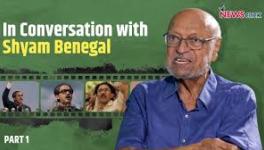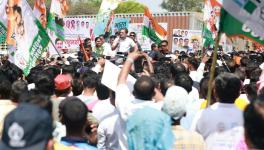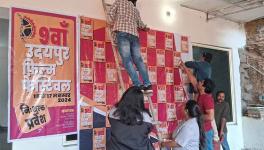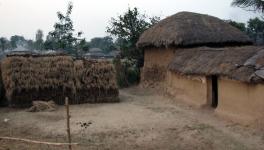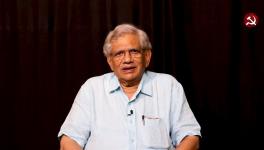Mythology, Modi and Science
Newsclick interviewed Dr. Satyajit Rath on recent comments by the Prime Minister on supposed scientific “achievements” of ancient India. Modi, while inaugurating a Reliance hospital in Mumbai, said that India had discovered genetic engineering and plastic surgery in the days of the Mahabharata. Dr. Rath says that these statements are part of the myth-creation that underpins the project of cultural nationalism of the RSS and the Sangh Parivar. Such myths seek to establish a spurious superiority for Hinduism and Sanatana Dharma and are central to Hindutva. They take us away from, rather than closer to, the contemporary challenges and possibilities of scientific research. Dr. Rath points out that the comments and their context indicate a fusion of Hindutva and a neo-liberal market-driven policy framework, wherein science and technology are seen purely from the point of view of business and profit, and not as a common collective resource to improve the lives of the bulk of the people.
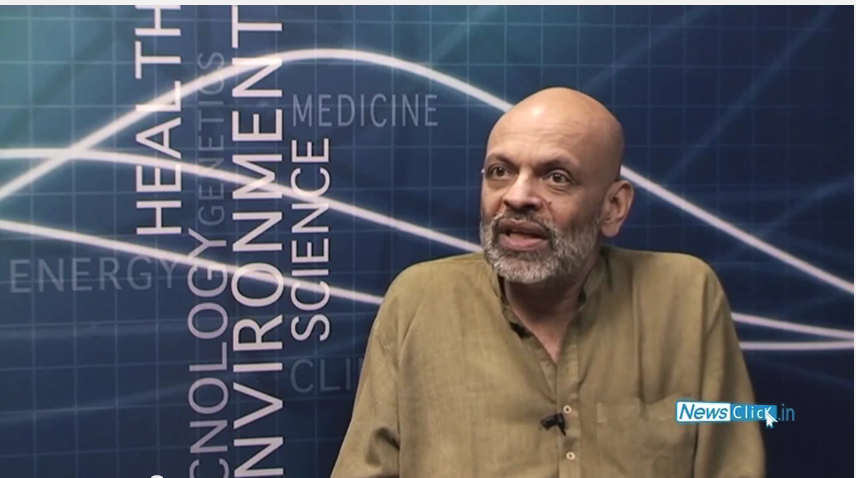
Rough Transcript:
Rishab Bailey (RB): Welcome to Newsclick. Prime Minister Modi while addressing a gathering in Mumbai recently took a leaf out of Dinanath Batra's books and claimed there are myths established that plastic surgery and genetic science were used in ancient India. Modi is basically spun story of an ancient India which had unparalleled achievements in science and technology which were somehow forgotten over time. But which we need to rediscover now. To discuss the issue we have with us Dr. Satyajit Rath, from the National Institute of Immunology. Thanks for being with us Satyajit.
Now what explains these comments given that there are actually real achievements you could commemorate about India's past, I mean, so why make up stories that are patently crazy?
Satyajit Rath (SR): It is interesting that what we feel like talking about are the achievements of the national ethos as the political fountain heads of the present government called it, Sawarker called it that the originators of the Rashtriya Swayamsevak Sangh that we need national unifying myths in order to build a sense of nationhood, reality wasn't clearly good enough. And as part and parcel of the assimilation process of the myth eventually you begin to treat myth as reality. You could surely think about if nothing else, the zero, you could surely think about variolation, you could, which is the predecessor of the smallpox vaccine, vaccination for a safe alternative but both Indian and Chinese physicians have practised variolation which was a form of vaccination. Somewhat more dangerous but all said and done, it was an interesting and empirical evidence based thoughtful intervention. Rather than talking about these, you talk about myths as reality. There's a certain continuity between treating ancient myths as reality and treating contemporary myths as reality as well.
RB: It fits in with what you've actually just been saying in terms of creating a discourse of a greater Hindu national pride or something like that, so you rarely actually hear about non Hindu achievements from the great and glorious past.
SR: There you go, the zero, for example, it's not entirely clear that the zero can be ascribed unambiguously to a Santana Dharmi tradition necessarily. All said and done, there have been astrologers, astronomers, mathematicians of yore around the Arabian sea from a variety of communities, from a variety of religious traditions, of extraordinary antiquity given how human migration has gone clearly they've talked to each other, clearly they've developed many of these ideas in conjunction with each other. And equally clearly, therefore, you can't use their outcomes to support an exclusive elite xenophobic notion of cultural nationalism.
RB: Now if you stretch logic or you are trying to be very kind. I mean, you could argue that Modi was merely making a point regarding the need for innovation and of being proud of one's cultural heritage and so on. Do you think that such comments even if patently falls could actually encourage Indians to turn towards science as a career and so on, I mean, can it be a good thing in rather convoluted manner?
SR: Think about the context in which this comments were made. The Sir Harkishandas Narottamdas Hospital is a hospital where some of India's earliest in vitro fertilization successes have happened. Surely, there's something of contemporary reality of immediate context to look back on with, if one must, with some measure of pride. Why is that not sufficient in context? It's not sufficient because the Prime Minister didn't really mean for his comments to be taken scientifically, literally. He was making a political point. Of course, he was making a political point, he's a politician, he was making a political point. He's a politician of a certain ideology which has made these points very consistently, for almost, not quite, decade in a bit short, of the past century.
RB: Now some have claimed that this is an attitude that will embolden communal forces such as those involved in the attack on Dabholkar, for instance, in Maharashtra.
SR: Oh please! This is an attitude will embolden communal forces. The outcome of the general election a few months ago will not do it but this will do it.
RB: This is one of the many things that contribute.
SR: All that this does is consolidate the narrative. And the narrative is a narrative of exclusive Sanatan Dharm sacralising cultural nationalists. But the Sangh Parivar has never made any secret of any of this. It would be disingenuous on our part to pretend as though we are discovering something that we didn't until now.
RB: Have there actually been any steps taken by this government other than making comments like this? To actually encourage scientific discourse or a scientific temperament in this country, for instance, by supporting public research and so on and so forth?
SR: I suggest to you that in answer to that, we should perhaps look once again at the context in which the PM made the comments that he made. The context was, the Harkishandas Narottamdas Reliance Hospital. An interesting conjunction that has come to me in the past few months again, unsurprisingly, but again as you say, worth our noting and highlighting, is the cooperative political combination of exclusive Sanatan Dharmi cultural nationalism on the one hand with the agendas of deregulatory corporate business neo liberal capitalism on the other hand and no more seamless conjunction, as an example, can be seen than in the PM's comments and context. But taking that further, it would therefore not be surprising if the notions of science and technology and innovation in science and technology we are seen by the present government to be far more relevant in the context of business oriented entrepreneurial sector oriented, profit making sector oriented innovation rather than into other directions. One, the notion of scholarship, of academic scholarship, of evidence based understanding of the natural and the social world around us as a means of citizenship empowerment. And secondly, the idea of innovations that would intervene in the lives of the underprivileged, the dispossessed, the poor, without the intervention of market based economies which are profit making. And for profit making, to serve as a necessary intermediary between the poor and their developmental progress is a non-starter idea. Yet, for the present government let us make no mistake about it. The notion of science and technology and innovations in science and technology contributing to societal goal is mediated through the private sector. Is this government likely to promote a non private, non corporate, social good vision of science, technology and innovation? Not very likely.
RB: We do hope you'll be able to join us again to take this issue up further. Thanks for being with us today, and thank you for watching.
Get the latest reports & analysis with people's perspective on Protests, movements & deep analytical videos, discussions of the current affairs in your Telegram app. Subscribe to NewsClick's Telegram channel & get Real-Time updates on stories, as they get published on our website.











